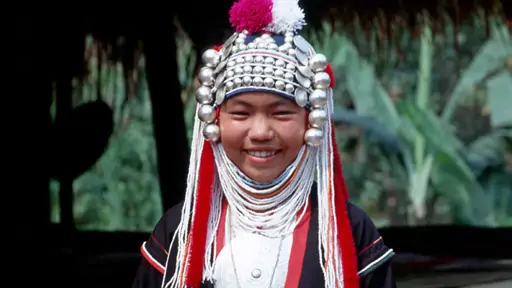Indigenous Calendar July, 2011: A Young Akha Girl Requests a Photo

The Akha are among the best known of the indigenous peoples of Southeast Asia. Most outsiders are familiar with these people from having signed up for tourist-oriented trekking trips to visit "hilltribe" villages in northern Thailand. The Akha also live in Burma, China, the Lao People's Democratic Republic and Vietnam.
While a good tour guide can provide an individual or small group with a basic introduction to these fascinating people, in-depth knowledge can be gained only from spending extensive time in their villages.
I was in northern Thailand in 2001 — traveling independently for about a week on a rented motorbike. During my travels I'd stopped by many indigenous villages. Although I'd already visited many of these same villages earlier with a tour guide I was still weary of just wandering into them on my own. Speaking, parrot-fashion, only the basic 'hello,' 'good-bye' and 'thank-you' words of their languages, and being aware that some outside visitors to their villagers are human trafficking agents, I expected that I might be regarded with some level of suspicion — even distrust. Yet my reception had never been hostile — only ranging from disinterest to being treated like a long-lost relative.
I returned to this Akha village about a week after first visiting it with my guide. Upon re-entering the village I got the impression that nobody remembered me. The villagers were friendly and I felt no discomfort, but their non-verbal communication was along the lines of 'hello, who are you?'
I felt disappointed at not being recognized and I was about to leave the village when this young girl approached me. Her greeting made it clear to me and everyone around that she had recognized me. Being of the younger generation she was dressed in sandals, a simple sarong and a western-style T-shirt. She took it upon herself to become my guide to the village for the next hour or so. That was a strange experience because of the language barrier but through sign-language we got by.
When we returned to her own house I (literally) pointed out the difference between her choice of dress and her mother's traditional Akha attire. I'm not sure if she misunderstood me to mean that I believed she should also dress more traditionally, or if she just wanted to demonstrate that she, also, owned traditional Akha clothes. She went into her house and re-emerged after about twenty minutes and insisted that I photograph her.
The Akha are featured in our documentary, Indigenous Peoples of Southeast Asia.
If you enjoyed reading this article, please consider supporting independent, advertising-free journalism by buying us a coffee to help us cover the cost of hosting our web site. Please click on the link or scan the QR code. Thanks!


